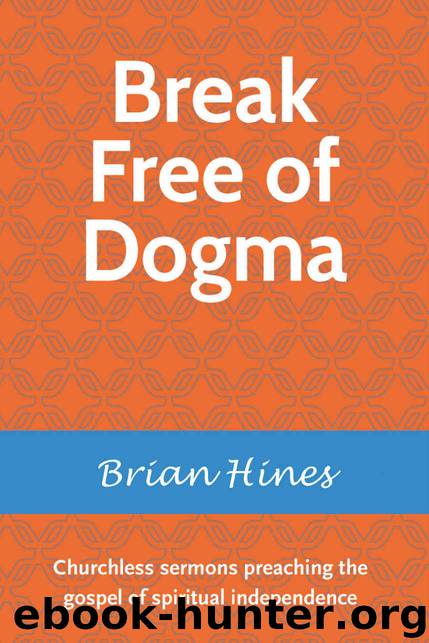Break Free of Dogma: Churchless sermons preaching the gospel of spiritual independence by Brian Hines

Author:Brian Hines [Hines, Brian]
Language: eng
Format: azw3
Published: 2019-08-07T16:00:00+00:00
The loosening of my ties to a religious organization was gradual. When this post was written I was still an active member. But my talks to our local group were becoming increasingly heretical. Or, in my view, truthful.
Don’t believe, just have faith
August 30, 2005
Sunday I gave a talk to my spiritual group that inspired me. So before I lose touch with my self-induced inspiration, I figured that I should capture it in a blog post. That way hopefully I can re-inspire myself as needed.
However, I have to admit that this whole way of thinking is at odds with what I was talking about. Namely, the absurd split between “I” and “me.”
More defensible are the splits between belief and faith or religion and science. Nonetheless, we humans love to divide up reality with concepts divorced from experience, then get anxious about feeling divorced from nature, other people, God, and ourselves.
Alan Watts says that the only way to cure anxiety is to honestly recognize what’s real about the human condition.
Suffering, pain, death, disease, unhappiness — yes, shit happens. This is a cold, cruel world. And also, a warm, comforting world. It’s up to us how it seems. Any alteration in the seeming, though, has to begin and end honestly.
In my talk I cited the adage that paranoids have enemies too.
Watts says in his wonderful book that I’m reading now, “The Wisdom of Insecurity,” it is wrong to make the presence or absence of neurosis the touchstone of truth, and to argue that if a man’s philosophy makes him neurotic, it must be wrong.
(This book was published in 1951, when people still talked about neuroses.)
So he says that it’s absurd to reason that because most atheists and agnostics are neurotic, and most simple Catholics are happy and at peace with themselves, the views of the former are false and those of the latter are true.
I liked this passage:
It is as if to say, “You say there is a fire in the basement. You are upset about it. Because you are upset, there is obviously no fire.” The agnostic, the skeptic, is neurotic, but this does not imply a false philosophy; it implies the discovery of facts to which he does not know how to adapt himself.
Like, I’m going to die. That’s a fact. I don’t know what to do about it.
I think about death frequently. I don’t like the idea of it at all, especially as it applies to me, myself, and I. As Woody Allen said (more or less), “I don’t want my works of art to live on after me. I want me to live on after me.” Amen, brother.
Everyone feels insecure about something or other. Usually, lots of things and lots of others. Watts says that religious belief is one of the main ways people try to deal with anxiety. The reality of uncertainty is replaced with a belief that such-and-such is going to happen for sure in the future.
Jesus saves. The second coming is coming. Allah welcomes the faithful into paradise.
Download
This site does not store any files on its server. We only index and link to content provided by other sites. Please contact the content providers to delete copyright contents if any and email us, we'll remove relevant links or contents immediately.
Never by Ken Follett(2922)
Machine Learning at Scale with H2O by Gregory Keys | David Whiting(2333)
The Man Who Died Twice by Richard Osman(2317)
Fairy Tale by Stephen King(2107)
Will by Will Smith(2083)
Reminders of Him: A Novel by Colleen Hoover(1907)
The Dawn of Everything: A New History of Humanity by David Graeber & David Wengrow(1584)
The Stranger in the Lifeboat by Mitch Albom(1568)
New Morning Mercies: A Daily Gospel Devotional by Paul David Tripp(1407)
Friends, Lovers, and the Big Terrible Thing by Matthew Perry(1354)
The Becoming by Nora Roberts(1349)
A Short History of War by Jeremy Black(1313)
The Strength In Our Scars by Bianca Sparacino(1298)
HBR's 10 Must Reads 2022 by Harvard Business Review(1267)
Go Tell the Bees That I Am Gone by Diana Gabaldon(1255)
Can't Hurt Me: Master Your Mind and Defy the Odds - Clean Edition by David Goggins(1247)
The Fall of Babel by Josiah Bancroft(1246)
515945210 by Unknown(1221)
Love on the Brain by Ali Hazelwood(1134)
